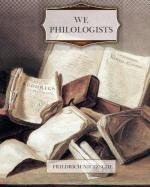67
Classical philology is the basis of the most shallow rationalism always having been dishonestly applied, it has gradually become quite ineffective. Its effect is one more illusion of the modern man. Philologists are nothing but a guild of sky-pilots who are not known as such . this is why the State takes an interest in them. The utility of classical education is completely used up, whilst, for example, the history of Christianity still shows its power.
68
Philologists, when discussing their science, never get down to the root of the subject . they never set forth philology itself as a problem. Bad conscience? or merely thoughtlessness?
69
We learn nothing from what philologists say about philology: it is all mere tittle-tattle—for example, Jahn’s[6] “The Meaning and Place of the Study of Antiquity in Germany.” There is no feeling for what should be protected and defended: thus speak people who have not even thought of the possibility that any one could attack them.
70
Philologists are people who exploit the vaguely-felt dissatisfaction of modern man, and his desire for “something better,” in order that they may earn their bread and butter.
I know them—I myself am one of them.
71
Our philologists stand in the same relation to true educators as the medicine-men of the wild Indians do to true physicians What astonishment will be felt by a later age!
72
What they lack is a real taste for the strong and powerful characteristics of the ancients. They turn into mere panegyrists, and thus become ridiculous.
73
They have forgotten how to address other men; and, as they cannot speak to the older people, they cannot do so to the young.
74
When we bring the Greeks to the knowledge of our young students, we are treating the latter as if they were well-informed and matured men. What, indeed, is there about the Greeks and their ways which is suitable for the young? In the end we shall find that we can do nothing for them beyond giving them isolated details. Are these observations for young people? What we actually do, however, is to introduce our young scholars to the collective wisdom of antiquity. Or do we not? The reading of the ancients is emphasised in this way.
My belief is that we are forced to concern ourselves with antiquity at a wrong period of our lives. At the end of the twenties its meaning begins to dawn on one.
75
There is something disrespectful about the way in which we make our young students known to the ancients: what is worse, it is unpedagogical; or what can result from a mere acquaintance with things which a youth cannot consciously esteem! Perhaps he must learn to “believe” and this is why I object to it.
76
There are matters regarding which antiquity instructs us, and about which I should hardly care to express myself publicly.




